The teen years are full of fun and excitement. But, from changes to their bodies to new relationships and the pressures of learning to be more independent, there are lots of things teens may be grappling with too. Here are some of the more common issues, with advice on what to do if you’re worried about them.
Puberty
Your teen may well already have gone through puberty, but in case they have any questions, Young Scot have developed a list of FAQs full of information:
School and exams
Your teen might be worried about school work and exams. Our page on helping your teen with their learning has advice that can help reassure them.
Teen friendships
The friends we make in our teens can last a lifetime – but friendships can sometimes be difficult at this age too. Let your teen to know they can always talk to you about what’s going on in their life. Often small things, like being left out of a social occasion or having their messages ignored, can seem massively important when you're a teen. So don’t dismiss their feelings, even if they seem a bit out of proportion to you.
Be sympathetic, and help them understand that arguments don’t have to mean the end of a friendship. Young Scot has some good advice for teens on what to do if they fall out with a friend.
Struggling to make friends
If your teen is struggling to make friends, Young Scot has tips to help them. The YoungMinds website also has useful tips to help young people cope with social anxiety with friends or new people. You can help them by working out some conversation starters together and practising small talk – you could even try a bit of role playing!
Romantic relationships and sex
As your teen grows up, they might start forming romantic relationships and may start exploring their sexuality. This is only natural – but it can be a concerning time for you. Talking about sex may feel uncomfortable and embarrassing, but the more you talk about it, the less awkward it will feel. The more open and honest you are with your teen, the more they’ll be able to make informed, sensible choices. And the more likely your teen will feel comfortable about their own sexuality and go on to form healthy, happy relationships.
Our page on talking to your teen about sex has more advice on discussing a range of issues with your child, including sexuality and gender identity, sex online, sharing nude photos and porn.
Children First also have good info on talking to teens about sex and there is also helpful advice on the NSPCC website about talking to your teen about healthy relationships and sex.
No matter what your teen’s relationship is with someone, they should be treated with kindness and respect. That’s Not OK from Young Scot helps young people learn how to spot the signs that something isn't right and say 'That's Not OK'.
Teenage loneliness
While children are rarely on their own, as they grow up they have to get used to being on their own more, and for some teens this can be unnerving. As teens struggle to form and assert their own identities, feeling as if they don’t fit in is normal. Even if they have a lot of friends or if they’re surrounded by family, they can still feel lonely, misunderstood or like they don’t fit in. The pandemic has only made this worse. And teens often feel emotions like loneliness even more strongly than adults.
So if your teen seems down or withdrawn, it may be because they’re feeling lonely. Talk to them about this. Reassure them that everyone else isn’t necessarily out there having fun and the things they see on social media are just a snapshot of other people’s lives, or might not be real at all. Including them in family decisions and encouraging them to meet up with friends in person as well as online can help them feel less left out.
In this short video, Child Psychologist Professor Cathy Richards discusses teenagers and how to support them if they are withdrawn or isolated.
Sexuality and gender identity
Sexuality and sexual orientation is about who you're physically and emotionally attracted to. Gender identity is the gender we feel we are inside. This may be a different gender to the sex recorded at birth, or neither gender, or both, or something else.
For many young people, understanding their sexuality and/or gender identity can be confusing and it’s perfectly natural for them to question who they are and how they fit into the world. They may want to talk to you about this, or they may prefer to work things out themselves. Try to let them come to you in their own time.
Talking honestly about sex and sexuality, listening to them and not judging will make it more likely they will come to you. Our page on talking to your child about LGBT+ and gender identity has more advice on how you can make your home a safe space for them to explore their feelings.
Here are some further sources of information and advice:
- The NSPCC and Children First have more advice on talking to your child about their sexual orientation and how to support them if they come out to you.
- “Dad, I’ve got something to tell you” is a useful leaflet answering questions dads might have when their sons come out as gay.
- You can find helpful information on gender identity on the YoungMinds and Place2Be websites. Gendered Intelligence offer support and advice for trans children and their parents.
- LGBT Youth Scotland's Trans, non-binary and questioning coming out guide for young people has helpful advice on questioning gender identity, coming out in a safe way, exploring gender expression and the rights of trans, non-binary and questioning young people.
Vaping, smoking and alcohol and drug use
Teenagers are natural risk takers – and while this can be a good thing, it can also lead to them experimenting with legal or illegal substances like vapes, tobacco, alcohol or drugs. All these substances can be harmful to a greater or lesser degree – and particularly to young people, whose brains and bodies are still developing. You can find more information about vaping, smoking, alcohol and drugs, and what to do if you’re worried about your teen’s behaviour, here.
Bullying
Nowadays bullying isn't just confined to school, it can happen at home or online. If you’re concerned about bullying, our section on bullying has lots of information and advice.
Childline offers advice to young people on dealing with bullying.
Worries around body image
Millions of young people worry about their body. This is only made worse by unrealistic pictures of others on social media. One thing you can do to help is to not be critical of other people’s appearance, even your own. By being more positive you are showing your teen how to act and that there’s nothing wrong with looking different.
Our section on body image and social media looks at the role social media plays in how young people see themselves, and how this can affect their health and wellbeing. It also has tips to help parents support teens to accept the way they look and value themselves for all they are, and to use the internet and social media in a healthy way.
Anxiety
All children and young people feel worried or anxious sometimes, and this is a normal part of growing up. At certain points, for example if they have to do something they haven’t done before or before an exam, young people may become more stressed, but tend to be able to feel better quite quickly afterwards.
Anxiety can become a problem when it becomes overwhelming or goes on for a long time, and stops them from doing other things. If your teen is struggling with anxiety, there are things you can do to help them – including being there for them, and helping them to take practical steps to work through it. YoungMinds have some good support on teenage anxiety.
Eating disorders
Teens’ eating patterns and choice of food can be quite random – this is quite normal and doesn’t necessarily mean there’s anything wrong. If you can, encourage them to eat healthily and avoid eating too much junk food.
For some teens, however, food can become a complex issue. Eating disorders can affect anyone from any age and any walk of life. An eating disorder is a serious mental illness, but it is treatable. If you're worried that your teenager may be developing an eating disorder, the charity Beat can help. If your child has been diagnosed as having an eating disorder, the Cared Scotland website has lots of resources that can help.
Our page on eating problems has more information and advice.
Self-harm
Self-harm, or self-injury, is when someone deliberately does something to hurt themselves. If you find out your child is self-harming this can be incredibly hard, but there is help available.
Our page on self-harm has more information. The YoungMinds website also has information on spotting the signs of self-harm and getting help, and there are also resources and advice available on NHS Inform.
Low mood and depression
Everyone feels low at some point. And it is common in teenagers. But if these dark moods are constant and stop them from doing things in their day-to-day life, you need to do something. The Breathing Space helpline is available to help teenagers who may be experiencing low moods and depression.
Our page on supporting teens with low mood and depression has more advice.
More information about identifying, treating and managing mental health problems and disorders can be found on NHS Inform. There is also advice for parents on the YoungMinds website.
Suicidal thoughts
All suicidal feelings should be taken seriously. Knowing or worrying that your child is experiencing suicidal thoughts can be incredibly distressing. The important thing to remember is that it is possible for your child to come out the other side and feel okay again, and that you are not alone.
Our page on suicidal thoughts has more information, and you can find advice if your child is having suicidal thoughts at YoungMinds and at Papyrus UK.
Money worries
It’s not unusual for young people to worry about money, just as adults do. If you’re concerned about your family’s financial situation, they may have picked up on things you’ve said. Or they may well have noticed that their own pocket money or money they earn isn’t buying as much as it used to. It could be that lack of money is making them feel isolated, because they can’t afford to do things their friends are doing. You can find helpful advice on this page on talking to young people about money on the YoungMinds website.
It’s also worth having a look at our pages on budgeting and saving money together and seeing if there are any savings you can make as a family. Talking the issues through and trying to find solutions will help your teen feel that the situation can be controlled. You could also suggest they look at the advice for young people on the Childline and Young Scot websites.
If you need to talk to someone about your family’s financial situation, you can contact the Money Talk Team for free, confidential advice.
Will the coronavirus pandemic have affected my teen’s mental health?
The coronavirus pandemic has been tough for teens. Just as they should have been finding their feet and becoming more independent, they’ve been stuck at home with limited options for socialising. They may feel they’ve missed out on key moments of their life they’ll never get back.
While we still don’t know what the long term effects of the pandemic will be, it’s important to remember that kids are often more resilient than we think. At the moment the best thing we can do to support our teens is:
- Having open and honest conversations with them about the pandemic and how everyone in the family is coping and feeling.
- Listening to their worries and taking them seriously – even if to us they seem unimportant in the grand scheme of things.
- Talking to them about ways to manage their worries (you’ll find some helpful tips for dealing with negative thoughts here).
- Encourage them to connect with friends as much as they can.
- Encourage them to get outside and stay physically active and try new activities – you’ll find lots of suggestions on our outdoor and physical activities and creative activities pages for teens.
- Keep a careful watch on your child for any signs of anxiety or depression.
We have lots of advice to help you talk to them and to see things more positively.
 Activities & Play
Activities & Play Behaviour
Behaviour Childcare
Childcare Development & Growing Up
Development & Growing Up Family, Friends & Relationships
Family, Friends & Relationships Feeding Your Baby
Feeding Your Baby Food & Eating
Food & Eating Health & Safety
Health & Safety Mental Health & Wellbeing
Mental Health & Wellbeing Money & Work
Money & Work Online Behaviour & Safety
Online Behaviour & Safety Pregnancy & First Days
Pregnancy & First Days School & Education
School & Education Sleep
Sleep

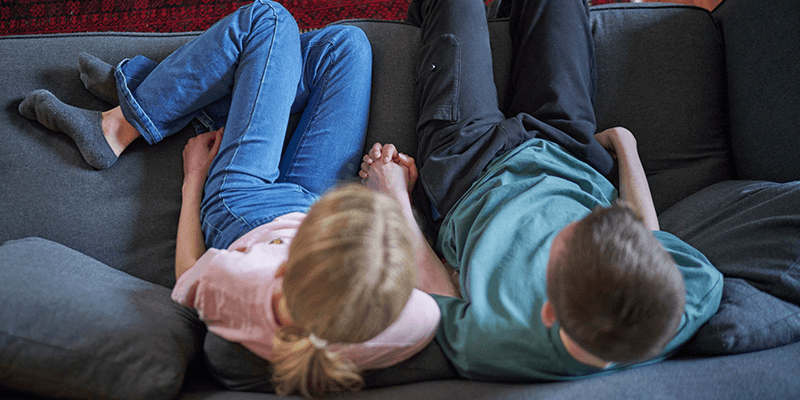

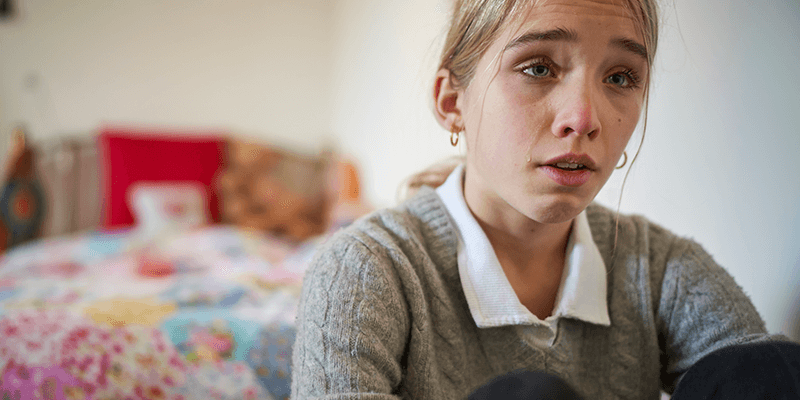
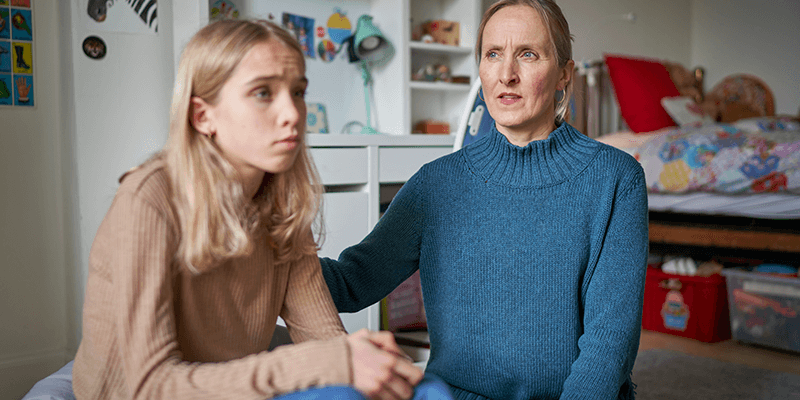
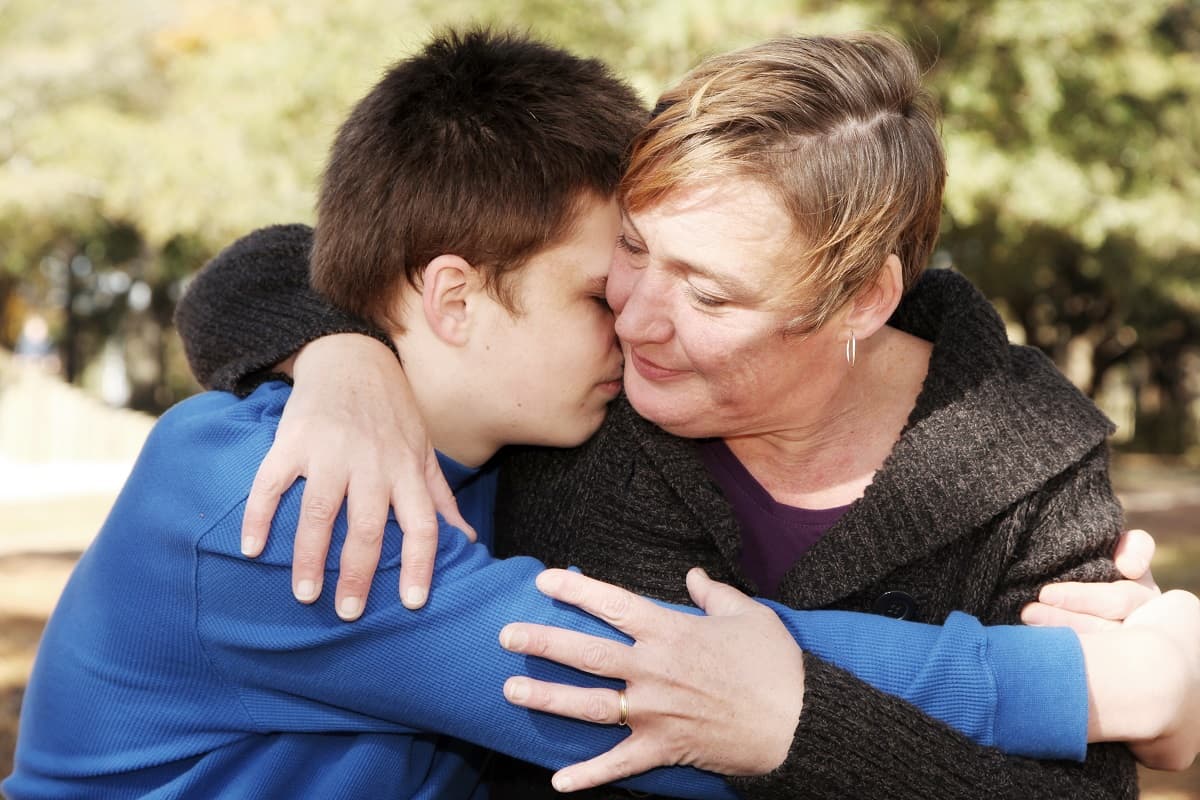
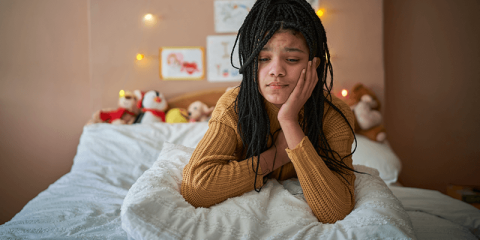



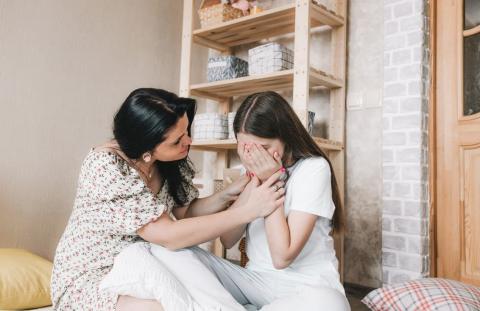


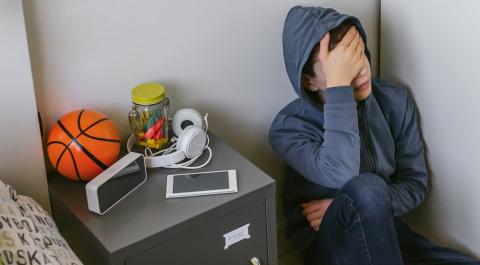

 Family, Friends & Relationships
Family, Friends & Relationships
 Mental Health & Wellbeing
Mental Health & Wellbeing